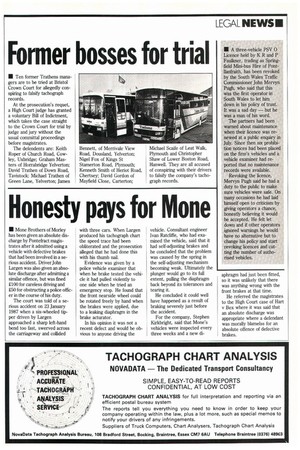Honesty pays for Mone
Page 15

If you've noticed an error in this article please click here to report it so we can fix it.
• Mone Brothers of Morley has been given an absolute discharge by Pontefract magistrates after it admitted using a vehicle with defective brakes that had been involved in a serious accident. Driver John Largen was also given an absolute discharge after admitting a similar offence, but was fined £100 for careless driving and £50 for obstructing a police officer in the course of his duty.
The court was told of a serious accident on 23 January 1987 when a six-wheeled tipper driven by Largen approached a sharp left-hand bend too fast, swerved across the carriageway and collided with three cars. When Largen produced his tachograph chart the speed trace had been obliterated and the prosecution alleged that he had done this with his thumb nail Evidence was given by a police vehicle examiner that when he brake tested the vehicle it had pulled violently to one side when he tried an emergency stop. He found that the front nearside wheel could be rotated freely by hand when the brakes were applied, due to a leaking diaphragm in the brake acturator.
In his opinion it was not a recent defect and would be obvious to anyone driving the vehicle. Consultant engineer Ivan Ratcliffe, who had examined the vehicle, said that it had self-adjusting brakes and he concluded that the problem was caused by the spring in the self-adjusting mechanism becoming weak. Ultimately the plunger would go to its full extent, pulling the diaphragm back beyond its tolerances and tearing it.
He concluded it could well have happened as a result of braking severely just before the accident
For the company, Stephen Kirkbright, said that Mone's vehicles were inspected every three weeks and a new di
aphragm had just been fitted, so it was unlikely that there was anything wrong with the front brakes at that time.
He referred the magistrates to the High Court case of Hart v Bex where it was said that an absolute discharge was appropriate where a defendant was morally blamelss for an absolute offence of defective brakes.








































































































